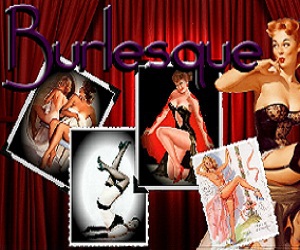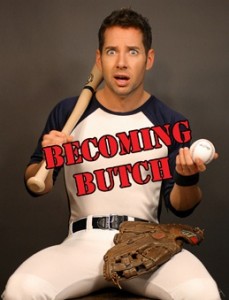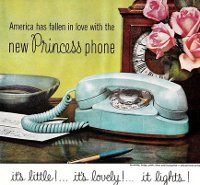Would anyone today contest the notion that growing up gay, as the youngest only son in a traditional white Catholic family in Queens during the seventies, would not be easy? Such is Vincent James Arcuri’s story, and in his one man, self-authored show, Becoming Butch, he delivers himself of it in an engaging comedic monologue. Vincent wasn’t one of those quietly gay boys (whoever they may be) but a real – shall we say? – screamer right from the checkered flag. There were three older sisters in the house and an atmosphere of femininity into which he fit right in. Until, that is – as a little boy who was supposed to do things “normal” little boys do – he didn’t. His father and uncles tried to wean him off Barbies and cheer leading and get him on to “harder” things, like baseball. At which his instinctual nature balked. At which Vincent sucked. It was the beginning of a fostered sense of inadequacy and self-rejection which many gay children experience, and prompted his prolonged stop-start campaign of becoming butch.
With so little in the way of external positive reinforcements available, is it any wonder he took an avid interest in the on-tap fantasy worlds television entertainment offered? Even here, however, perhaps something resistant and pugnacious was at work when he elected as his childhood role model Arnold Jackson, the character played by black actor Gary Coleman in Diff’rent Strokes. Arcuri dwells on the humorously inappropriate aspects of his youthful enthusiasms more than their psychological edge and import. In some measure those speak for themselves, as when he re-enacts a high school bullying scenario which abruptly shifts the tone and atmosphere of the narrative. It’s harsh and unsettling, devoid of the comic twist used to disarm the jibing critiques thrown his way by well-meaning, masculine relatives. Which speaks impressively of the degree of control Arcuri exercises over of his audience. Just how much of a “faggot” he really is occupies a huge part of his developing personality, and the trauma is suggested through recollections of incidents played more for laughs than for any claims of sympathy. Sympathy, the broader reach of this performance, is something young Vincent rarely finds for himself; not until fears, tears, and years later.
All the TV soap bubbles propel young Vincent toward a career as an actor. But even in this would-be-make-believe realm he is told he is unacceptable, too much a type as himself, too “gay” to find favor with casting directors. He takes speech lessons and tries sports in order to butch himself up. It’s arduous and all but ineffectual. The breakthrough, believe it or not, occurs when he falls in love. A shift begins that launches him into the greater world, or at least to L.A., where dreams really can come true (for actors).
In essence it’s not a story that is unfamiliar, certainly to gay people or anyone in touch with them. There’s something generic about it, its insistence on the ordinariness of the social environment, the family dynamic of tough, straight-man dad; ever-approving, doting mother; extended family of types. Nothing in his story – from his childhood fears, to his Catholic guilt, and West Hollywood run-ins – partakes of the unusual, the strange. Can this really be the case, or are we being served an account that has been tamed, pruned of thorns; a history divested of anything that might be deemed too queer? There’s something gratingly mainstream in its address. A projected dial graphic, like something from a TV game show, regularly clocks score ratings for the butch factor in each episode.
As a performer Arcuri is captivating – sharp, funny, and convincing. He has a deft sense of comic timing and a highly expressive face that can swoop up and down the register with the flick of an eyelash. Enjoyable as this piece is, one feels that he could go much further without the weighted attachment to light entertainment. In the meantime though, perhaps he can be happy in the knowledge that he’s certainly a crowd pleaser.
~~~
BECOMING BUTCH
Writer: Vincent James Arcuri
Director: Gary Riotto (NY), Louis J. Cuck (CA)
From the streets of Queens, NY to life amongst the queens in West Hollywood, CA, Vincent’s coming-of-age tale takes audiences on a rousing journey through baseball, soap operas, speech lessons and more to redefine the true meaning of becoming butch.
1h 5m National Los Angeles, California
Comedy Solo Show
Staycation: Family Vacation Celeb-reality TV in Hollywood
www.BECOMINGBUTCH.com
VENUE #11: The Steve & Marie Sgouros Theatre
Fri 17 @ 3 Tue 21 @ 2:45 Thu 23 @ 6:30 Fri 24 @ 8 Sat 25 @ 5:45 Sun 26 @ 12








{ 0 comments… add one now }